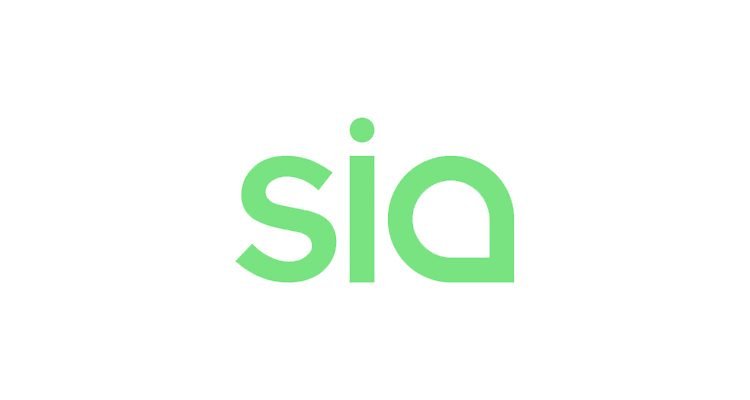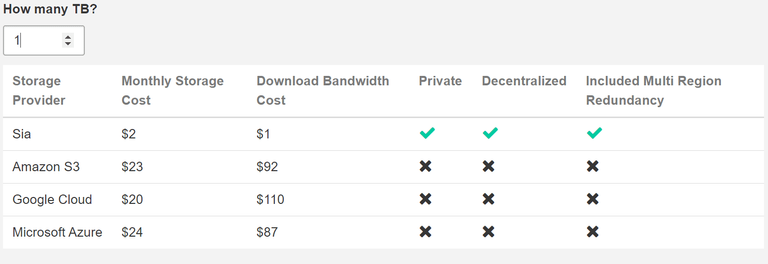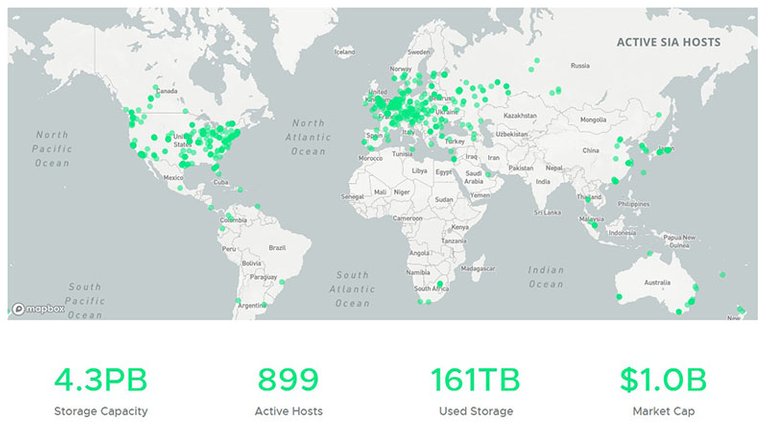
Siacoin is the cryptocurrency behind the company Sia – A company owned by Nebulus Inc. Sia is aiming to reinvent cloud storage by using a peer to peer network, blockchain technology and smart contracts to provide a decentralised and cheaper alternative to traditional cloud storage services such as Dropbox and Google Cloud. Their long term aim is to become, what they call, the backbone storage layer of the internet.
The Basics of Siacoin
The Sia platform will connect “hosts” and users. If you want to store files you will upload your file to the Sia network. This network isn’t made up of traditional servers and your files are stored on in one place. Instead it is up made of other users called hosts that have chosen to give up a small amount of their computer storage space in exchange for Siacoin.
Sia is built in such a way that anyone is able to rent out extra space on their PC to the Sia decentralised network. It’s built around the use of Siacoin which is a special purpose currency for the Sia network that executes file storage smart contracts on the Sia blockchain. This means that the host has to keep the files for a previously specified time and in an previously specified space. After the end of the agreement, the payment will be released to the host in Siacoin. This is assured by the use of the smart contract. If the host loses the files then the smart contract is void and they won’t get paid. These smart contracts on the Sia blockchain ensure that both the user and the host will be satisfied. This is only possible with the use of the Siacoin cryptocurrency. Through the use of the blockchain and smart contracts, hosts get paid in Siacoin and ny user who wants to use Sia storage needs to pay Siacoins to a host.
One of the great advantages that the Sia platform offers is the incredibly low price of storing files. Sia currently offer a TB of cold storage for about $2 a month. In comparison to Amazon S3 (Simple Storage Service), which costs $23 a month, this is a saving of over 90%!

How does Sia Work?
This section will dive a little deeper into how Sia and Siacoin actually work.
The first thing that happens is that the files that the users want to store are divided into 30 segments before being uploaded using the Sia software. Each segment is then distributed to a different host across the world. This assures that there isn’t a single point of failure which is generally present with centralised storage systems. Files segments are created using something called Reed-Soloman erasure coding that is commonly used in DVDs. This allows the files to be divided in a redundant manner and means that 20 of the 30 segments can be lost and the user is still able to recover their files.
Each file is then encrypted by the Twofish algorithm before it leaves the user’s computer to ensure that the hosts only handle encrypted data. As Sia is built on the blockchain it means that all user data is encrypted by default. In comparison to services like Amazon’s storage solution, Sia is theoretically much more secure as Amazon do not encrypt data by default.

The files are then sent to the 30 hosts around the world using smart contracts. These contracts set pricing, uptime commitments and other aspects of the relationship between the users and the hosts. These are called File Contracts and are automatically enforced by the Sia network. There’s no need for a third party intermediary.
These file contracts are paid for and secured using Siacoin. The users who want to store files can buy storage capacity from hosts using Siacoin. Hosts will have to deposit Siacoin into each file contract as collateral for the contract, this also provides a strong disincentive for host to go offline and lose the files. The payments between hosts and users all occur off-chain using something called a payment channel, that is said to be like the Bitcoin Lightning network. This means that the network can remain efficient and can theoretically scale much easier.
The renewal of these contracts can happen automatically and repayment for storage can be written into the initial contract. They typically last 90 days and if contracts are not renewed then Sia will return any unused coins to the user at the end of the contract period.
At the end of the contract the host must provide proof that they are storing the user’s data with something called storage proof. If this appears on the blockchain within a certain time then the host will be paid. Storage proofs are based on the technology of Merkle trees, the same technology used in Bitcoin. These make it possible to prove that data is part of a larger file whilst being very small in size themselves.
Roadmap
History
Sia and Siacoin are a relatively unique for today’s cryptocurrencies as there wasn’t an ICO or pre-mining to help with initial funding. Instead they went down the more traditional route and sought funding from investors. To date they have investments from some prominent investors, including Procyon Ventures, Raptor Group, Fenbushi Capital, and angel investors like Xiaolai Li.
In 2014 the company was founded and the first round of funding was completed. In 2015 the company rolled out it the beta version of the Sia platform and in 2016 it was fully released. 2017 saw additional team members added and work continues on stabilising and improving the platform.
Future
Sia have high aims for the ultimate goal of the company and the coin. Short term goals include implementing a file recovery system that allows users to recover lost files using their wallet seeds. Longer term plans include implementing an increased to supported file sizes so users can store up to 10TB of data. Other aims are to add in mobile support and even a video streaming service.
In 2018 they plan to have it completely production ready for cold storage and hope to see companies begin to use it. In 2019 they hope to start to reach similar speeds to Amazon S3 with an additional move towards warmer storage and introduce content distribution features. In 2020 they see themselves as a true competitor to Amazon S3 and expect companies to start to migrate to their platform.
Team
The team at Sia mostly comprises of a few young software developers working out of Cambridge Massachusetts.
David Vorick is the CEO and one of the co-founders of Sia. In addition to being the CEO, he is also one of the lead developers of Sia. He graduated from Rensselaer Polytechnic Institute with a BS in Computer Science.
Luke Champine is the other co-founder of Sia. Luke also studied at Rensselaer Polytechnic Institute with David but dropped out of college to work on Sia full time. He is Sia’s core developer with a passion for programming.
Trading Information
Like a lot of altcoins Siacoin saw a huge explosion of growth in early January of 2018. Since then it has gradually corrected. For more statistics and information head to out post on Cryptos Decoded
How to Buy Siacoin
There are a limited number of exchanges that Siacoin is available on at the moment. The largest are Bittrex and Upbit but Poloniex also trades Siacoin. Bittrex and Upbit have most of the market share with a high trading volume. It can be traded for Bitcoin or Ethereum.
How to Store Siacoin
The is currently only one way to store Siacoin and that is the official desktop wallet on the Sia website’s getting started page.
Siacoin Mining
Siacoin is a mineable coin and is fairly simple to get mining and join an mining pool. The official Sia website has all the news and information you’ll need to get started with a Siacoin mining pool.
Competition
The main competition to Siacoin comes in the form of traditional cloud storage companies. Amazon S3 is almost exactly like what Sia is aiming to be and therefore Sia have a pretty big hurdle to overcome. In addition to this there are the warm storage competitors such as Dropbox and Microsoft OneDrive.
There is also direct competition from other crypto companies such as Storj and Maidsafe. In addition to this there are projects that aim to solve very similar problems. For example Oyster Pearl is looking to provide a decentralised cloud storage system whilst also offering a way for websites to monetise their content without the use of adverts.
Our Opinion on Siacoin
Decentralised cloud storage using blockchain technology is inevitable and the ability to securely store files on a blockchain provides huge advantages over standard cloud storage. Being the first company that succeeds at providing a usable and reliable decentralised cloud storage system will likely be huge for the coins price and could therefore be a great investment opportunity.
Pros and Cons
Pros
- Sia Storage Cost – Being able to store 1TB of data at a less than 10% of the price of Amazon S3 could be potentially huge! It’s a fantastic deal for the customer and if knowledge of spreads and the platform grows successfully then it could easily become the go-to for cold storage of data.
- Privacy – All data that is ever uploaded to the Sia network is encrypted which means that only you will ever know what is on it.
- Security – Having redundant storage on a blockchain by splitting the users file into several segments means that backups of the data will always be safe. Add this to the encryption of the users data and the plans to add wallet seed backup probably makes using Sia the most secure way to store data.
Cons
- Complicated Process – Makes the process of storing files more complicated that traditional methods so may put some people off.
- Can only use Siacoin – Only allowing Siacoin payments decreases the likelihood of user adoption as it adds another, somewhat complicated, step to the process.
- Wallet – The Sia wallet could definitely be improved, and as it’s the only way to store coins, it needs to be improved.
Conclusion
Overall, we think that Sia is a very interesting project and in a time where data decentralisation, privacy and security are becoming more and more important companies like Sia will become hugely valuable.
A lot of the value of Siacoin and Sia will come from user adoption and currently this is looking quite promising. With the low prices that Sia is offering this is expected to continue.